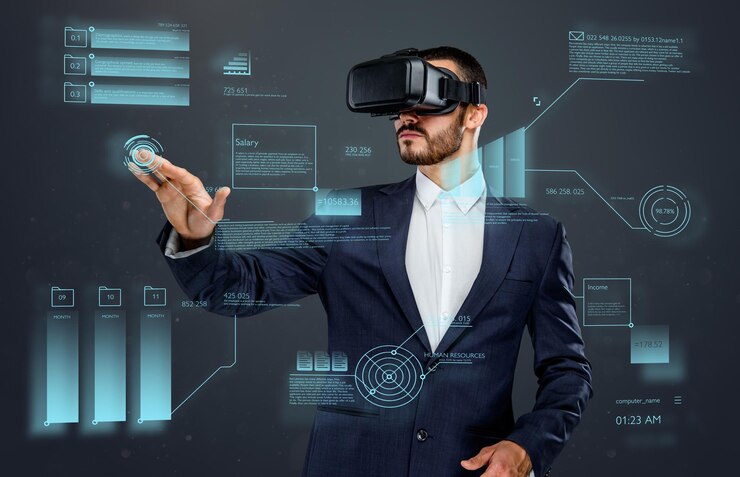As technology continues to evolve at an unprecedented pace, it’s essential to stay informed about the innovations that are reshaping industries and our daily lives. From artificial intelligence to blockchain and beyond, these emerging technologies are revolutionizing the way businesses operate and how people interact with the world around them. Sean Bassik, a thought leader in the tech space, delves into the top emerging technologies that are driving this transformation and the potential they hold for the future.
In this blog, we’ll explore five key technologies that Sean Bassik believes will have a lasting impact on industries across the globe.
1. Artificial Intelligence (AI)
Artificial intelligence is no longer a futuristic concept—it’s already here, and it’s playing a significant role in various sectors, from healthcare to finance to manufacturing. According to Sean Bassik, AI’s ability to process vast amounts of data and make intelligent decisions is transforming industries in ways we couldn’t have imagined just a decade ago.
In the healthcare industry, AI-powered systems are being used to improve diagnostic accuracy and personalize treatment plans. In finance, AI algorithms are detecting fraudulent transactions faster than ever before, and in manufacturing, AI-powered robots are improving production efficiency and reducing costs. Sean Bassik emphasizes that as AI continues to evolve, it will unlock even more opportunities for businesses to innovate and stay competitive.
One of the most exciting developments in AI, according to Sean Bassik, is the rise of machine learning and deep learning technologies. These advanced AI systems are capable of learning from experience and improving their performance over time, enabling new possibilities in everything from autonomous vehicles to predictive analytics.
2. Blockchain Technology
While blockchain is best known as the underlying technology behind cryptocurrencies like Bitcoin, Sean Bassik highlights that its potential applications go far beyond digital currencies. Blockchain’s decentralized and transparent nature makes it ideal for secure transactions, data sharing, and supply chain management, offering the ability to streamline operations while enhancing security and accountability.
For businesses, blockchain technology offers a secure and transparent way to track the provenance of goods, manage digital identities, and reduce fraud. Sean Bassik also points to the growing interest in decentralized finance (DeFi), which leverages blockchain technology to create more inclusive financial services by eliminating traditional intermediaries.
Another exciting area where blockchain is making strides is in smart contracts—self-executing contracts with the terms of the agreement directly written into code. These contracts can automatically enforce agreements when certain conditions are met, reducing the need for intermediaries and making transactions more efficient and cost-effective. Sean Bassik sees blockchain’s ability to foster trust and transparency as a game-changer for industries like finance, healthcare, and real estate.
3. The Internet of Things (IoT)
The Internet of Things (IoT) refers to the network of connected devices that can communicate with each other and share data in real-time. From smart home appliances to wearable fitness trackers, IoT is already making our lives more convenient and efficient. However, Sean Bassik notes that the true potential of IoT goes far beyond consumer gadgets.
In industries like logistics, IoT-enabled sensors are revolutionizing supply chain management by providing real-time data on the location, condition, and status of goods in transit. In healthcare, IoT devices are being used to remotely monitor patients’ health conditions and deliver personalized care. Sean Bassik highlights that IoT’s ability to provide real-time insights is driving improvements in everything from predictive maintenance in manufacturing to energy management in smart cities.
As the number of connected devices continues to grow, the challenge will be managing the massive amount of data generated by IoT networks. According to Sean Bassik, advancements in data analytics and edge computing will play a crucial role in ensuring that IoT systems remain efficient, scalable, and secure in the future.
4. 5G Technology
The rollout of 5G networks is set to revolutionize the way we connect to the internet. With faster download speeds, lower latency, and the ability to support a massive number of connected devices, 5G will enable new applications in areas such as autonomous vehicles, virtual reality (VR), and augmented reality (AR). Sean Bassik sees 5G as a critical enabler of the next generation of digital experiences and technological innovations.
For businesses, 5G will unlock new possibilities for real-time data processing, enhanced customer experiences, and remote work. For example, 5G-enabled augmented reality could transform the retail industry by allowing customers to virtually try on clothes or visualize how furniture would look in their home. In healthcare, 5G’s low latency will enable remote surgeries and more reliable telemedicine services.
Sean Bassik emphasizes that 5G’s transformative power extends beyond faster internet speeds—it will enable entirely new industries to emerge, from autonomous transportation to smart cities powered by connected infrastructure.
5. Quantum Computing
Quantum computing is still in its early stages, but Sean Bassik believes that it holds the potential to solve complex problems that are currently beyond the capabilities of classical computers. Unlike traditional computers, which store data in binary form (as 1s and 0s), quantum computers use qubits, which can exist in multiple states simultaneously. This allows quantum computers to perform calculations exponentially faster than classical computers.
Quantum computing could revolutionize fields like cryptography, drug discovery, and climate modeling by enabling the simulation of complex systems and the analysis of vast datasets. For businesses, quantum computing could unlock new possibilities in optimizing supply chains, improving financial modeling, and developing advanced AI algorithms.
While quantum computing is still in the research phase, major tech companies like Google, IBM, and Microsoft are investing heavily in its development. Sean Bassik sees quantum computing as a long-term game-changer that will eventually disrupt industries and solve some of the world’s most pressing challenges.
Conclusion
The future of technology is incredibly exciting, and Sean Bassik is at the forefront of exploring and understanding the emerging innovations that will shape our world. From artificial intelligence and blockchain to IoT and 5G, these technologies are not only transforming industries but also improving the way we live, work, and connect with each other.
As these technologies continue to evolve, Sean Bassik believes that businesses must stay informed and adapt to capitalize on the opportunities they present. By embracing emerging technologies, companies can improve efficiency, enhance customer experiences, and stay competitive in an increasingly digital world.
Stay tuned to Sean Bassik’s blog to learn more about the latest trends in technology and how they’re shaping our future.




